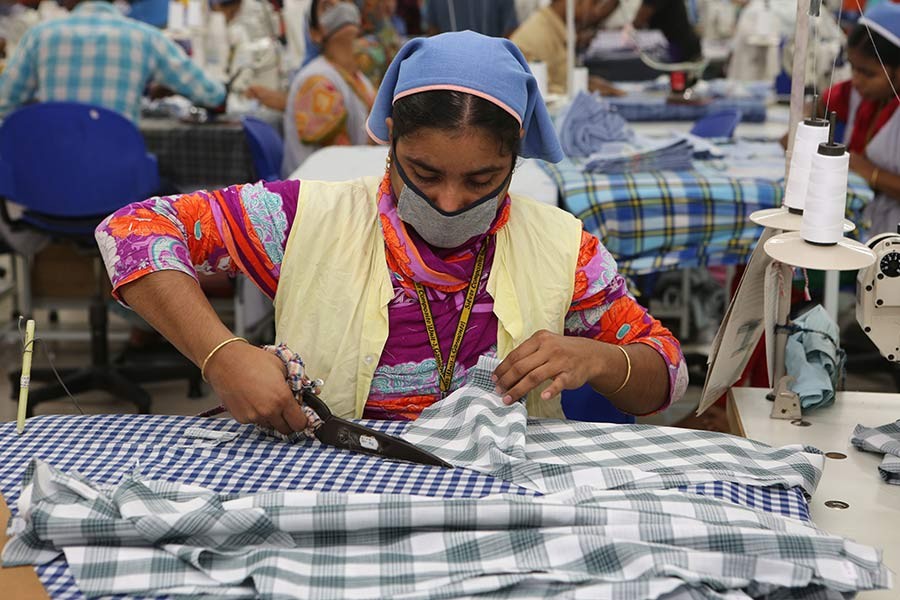Improved work environment in the factories and policy support from the government have brought about positive result in the country's garment sector by overcoming various setbacks.
The government is supporting the ready-made garment (RMG) industry through policy initiatives. Last week, the National Board of Revenue (NBR) reduced tax at source on exports to 0.25 per cent from the previous percentage of 0.60 per cent.
Export earnings from the RMG sector rose to US$ 30.61 billion in 2017-18 fiscal year (FY). Exports have increased by 15.65 per cent in first six months (July-December) of 2018-19 FY. Business in the apparel sector has increased two and half times in the last one decade. The sector now accounts for more than 83 per cent of the country's total export earnings.
Although the tragic incidents like Tazreen Fashion factory and Rana Plaza disasters had dealt major blows to the sector, the industry recuperated with significantly improved working conditions. The biggest achievement in the garments sector in the last one decade is the improved work environment in terms of labour safety. It played a major role in recovering the image of the sector. Moreover, use of advanced technology by 20 per cent of the factories has proven vital in increasing production.
There are, however, some drawbacks in the industry as well. Labour rights are still being ignored in many cases. Intermittent demonstrations of RMG workers due to various grievances are still a thorn in the sector despite the buoyant market.
RMG workers took to the streets for 10 days over the last two weeks demanding parity in wages. The government decided to raise the wage in six grades to address the grievances. Relations between owners and workers are not improving. This is one of the biggest challenges of the industry. Vested quarters are taking advantage of such weakness.
However, the factory insiders say most of the factories received adequate work orders in recent years. Also, the industry has reduced its dependency on traditional markets such as US, European Union (EU) countries and Canada and expanded its business in new countries.
Although the work orders have increased, the reality is that the factories cannot take all the orders as the prices offered by the buyers are relatively low. Increased production costs dent the country's efficiency to compete with others.
Duty-free excess of Bangladesh products to the EU market will end in 2027 as a result of elevation of the country to developing country's status. This will pose a major challenge to the RMG sector. As such, the country's garment industry needs to move up the value chain to remain competitive in the global market. From traditional products, Bangladesh needs to move to branded products. There is also a need for enhancing negotiation capacity of entrepreneurs. They should focus not only on price competitiveness but also on quality,
There is no denying that the country's apparel industry is seriously lacking skilled labour force, which is hurting the scope of moving up the value chain. Analysts say Vietnam is going to pose a threat to the country's RMG market in the near future, and that threat will come not in terms of price competitiveness but in terms of quality.
According to an international study, apparel workers in Bangladesh work for 60 hours per week while it is 47 hours in Cambodia and 46 hours in India. At the same time, 54 per cent of garment workers are living below the minimum wage in Bangladesh.
The country needs to integrate its economy regionally through platforms like the South Asian Association for Regional Cooperation (SAARC) and the Bay of Bengal Initiative for Multi-Sectoral Technical and Economic Cooperation (BIMSTEC). This, in turn, will help the country to expand its market within the region. Bangladesh also needs to sign free trade agreements (FTAs) with countries around the world. While Vietnam has FTAs with around 20 countries, Bangladesh has none.
There is a serious lack of marketing and negotiation capacity from Bangladesh side. Already, a good portion of manufacturing jobs is shifting from China to countries like Vietnam and Cambodia. But Bangladesh is yet to take benefit of that.
Again, management of the labour regime is an issue of serious concern for the local garment industry. Apart from ensuring adequate wage for the garment workers, workplace safety and compliance issues need to be addressed quickly to remain competitive in the global apparel market.


